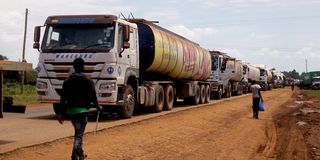Prime
We buy Covid results at Shs150,000 - drivers

Fuel trucks destined for Uganda queue at Matayos Town on Kisumu Busia highway as they await clearance into Uganda on Monday. PHOTO | FILE
Some long distance truck drivers have been paying health workers at Malaba and Busia border posts to get negative Covid-19 results.
The drivers and their association leaders confirm that since they are required to enter into some East African countries with a Covid-19 negative certificate, the easiest way to acquire it is to pay between Shs50,000 and Shs150,000.
“Truck drivers are paying the people testing to get Covid-19 negative results. This compromises the efforts we put in containing the pandemic,” Mr Omongo Ndugu, the executive director of Uganda Professional Drivers’ Network and the vice chairperson of Uganda Long Distance and Heavy Truck Drivers’ Association, told Daily Monitor on Tuesday.
“Bribery is a big issue at both entry points, drivers are being forced to pay for things that are not paid for. I don’t know who told these people (officials) that drivers have a lot of money and therefore must pay for all this,” Mr Ndugu said.
Long queues have continued to form on the two entry points on both sides of the borders, and sources say both health workers and security forces have taken advantage of the situation to extort money from the truck drivers.
Sources say while Kenya tests the drivers freely, Uganda charges $65 (about Shs240,000) for a single Covid-19 test.
As a result, Kenya run out of testing kits, and now all drivers are being directed to test from Uganda.
Busia receives between 700 to 1,000 trucks a day with the bulk being fuel tankers while Malaba averages at 1,500.
Mr John Kairuki, a truck driver from Kenya, said last week, the queues were unbearable so one had to part with between Shs50,000 and Shs120,000 to cross the borders.
He said when drivers arrive, they are approached by brokers at strategic points.
On paying the agreed amount, the brokers disappear for a while and come back after 30 minutes or sometimes two hours with a Covid-19 negative result.
“Last week, we paid between Shs50,000 and Shs150,000 for Covid-19 negative results and after about an hour, we were cleared to proceed. Why should I spend many days at the border if I can get the money and pay them to cross the border easily?” Mr Kairuki asked.
Another driver, who preferred anonymity, said he first paid KShs5,000 (Shs170,500) to Kenyan security forces to cross into Kenya last week, and then paid Ugandan officials Shs120,000 on return to get a negative certificate.
Mr Muhamad Hussein, a fuel tanker driver, who had spent six days from Sega, a 30km distance to the Busia border (Kenyan side) and is yet to reach the border, said corruption by the Kenya police was partly the cause of the queues.
He said whereas he had the Covid-19 certificate, he was still held up because the Kenya police were allowing trucks that pay money to bypass the long queues while those without money are left in the jam.
“I have seen drivers paying between KShs500 (17,500) to KShs2,000 (Shs68,000) to be allowed to proceed at the expense of those who do not pay,” Hussein said.
Mr Innocent Masiga, a Kenyan clearing agent at the Busia border, said the Kenya police had turned the drivers’ woes into a money-minting machine.
He said trucks going to load maize at the Busia cereal market in Uganda are given right of way after paying between KShs200 (Shs6,800) and KShs500 (Shs17,500).
“The trucks and fuel tankers carrying essential goods into the region are kept in the queues if the drivers can’t pay but those who pay are allowed to proceed,” he said.
Mr Stanley Gakenga Kaberenga, a another fuel tanker driver, said they are facing a shortage of basic needs.
“We have no hotels where we can buy food, no clean water,” he said.
Mr Joseph Kanyiri Murithi, the county commissioner of Busia County Kenya, dismissed the allegations.
“These are allegations. What we deal with is anything that has evidence of any one taking bribes. They (drivers) should report to the police or my office,” Mr Murithi said.
He added that some drivers do not have coronavirus certificates and when they are told to park, they begin complaining.
What authorities say
Dr Joyce Moriku Kaducu, the Ugandan State Minister for Primary Healthcare, said the long queues and bribery allegations were denting the country’s effort to combat the pandemic.
She, however, said the drivers are to blame because they were told to test before coming to the border.“ It was made clear that if a truck is getting here, one should come with test results. Likewise, when ours are going the other side, they should also do the same. But why should they all gather at one point without results, taking us backwards?” she asked. The minister said temptations of bribery are possible but added that government was devising means to deal with forged certificates.
“We have been meeting to see how to identify authentic results from the ministry. That is the only option and secure way,” she said.
Brig Gen Flavia Byekwaso, the UPDF spokesperson, said her office had not received reports on the allegations of extortion by security forces. “It has not come to my office, and I need to cross check with the joint chief of staff and the military police and hear what they will say,” she said.
Mr Sjoerd H Visser, an official of Trade Mark East Africa, said they were in talks with Ugandan authorities to clear trucks that have essential supplies as they look for a lasting solution to the challenges along the supply route.
Dr Peter Mathuki, the chief executive officer of East African Business Council, said they were looking into how Kenya and Uganda can work together to have a permanent solution to shortages of testing kits and reagents.


